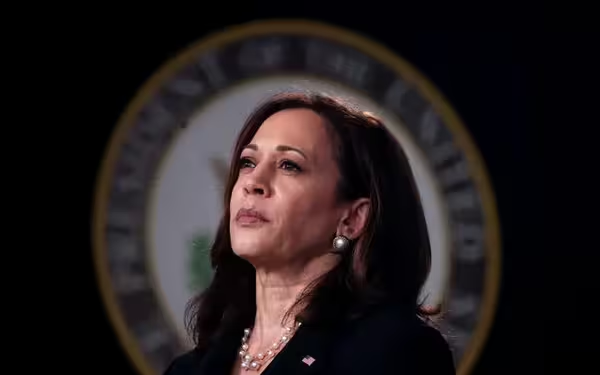Saturday, November 16, 2024 07:55 PM
Kamala Harris: A Rising Contender in U.S. Politics
- Harris leads Trump in recent polls.
- Focus on affordable childcare and healthcare.
- Navigates complex geopolitical issues carefully.
 Image Credits: thefrontierpost
Image Credits: thefrontierpostKamala Harris gains popularity as she navigates U.S. politics, leading Trump in polls and addressing key issues.
In recent months, the political landscape in the United States has shifted dramatically, particularly concerning Vice President Kamala Harris. Initially, many Democrats were skeptical about her ability to compete against former President Donald Trump. However, recent events, including a notable performance at the Democratic National Convention, have sparked a renewed interest in her candidacy. This change has led to a surge in her popularity, as evidenced by a recent Reuters/Ipsos poll showing her leading Trump by 45 percent to 41 percent.
During a rally in Savannah, Georgia, Harris addressed a crowd of 9,500 supporters, urging them to focus on their hard work rather than the polls. She stated, "Don’t pay attention to polls – we are underdogs," emphasizing the need for determination and effort to secure victory. Her supporters braved the rain and humidity, eager to hear her speak about the issues that matter to them.
In her speech, Harris reiterated familiar themes, criticizing Trump for moving the country backward and advocating for affordable childcare and healthcare. She also touched on the concept of "building intergenerational wealth" through an "opportunity economy," though specifics on these ideas were notably absent. While some of her more progressive views remain in the background, she has taken a more centrist approach, especially regarding sensitive topics like the ongoing conflict in Gaza.
Harris has been careful to navigate the complex geopolitical landscape, placing blame on Hamas for the war while avoiding accusations of genocide against Israel. This strategy appears to be a calculated move to maintain support among American voters, as a significant majority stand firmly with Israel. In her first interview since her nomination, she reiterated her commitment to tightening migration laws and sidestepped questions about arms sales to Israel, stating, "We must get a deal done." This response reflects her awareness of the political implications of appearing anti-Semitic.
Moreover, Harris has distanced herself from the Biden administration's challenges at the border and attempted to clarify her stance on fracking, claiming her "values had not changed." However, this assertion raises questions about her true beliefs and whether they align with the views of independent voters, who may be crucial in the upcoming election.
As the election approaches, it is clear that Harris is attempting to reshape her image from a second-rate politician to a serious contender. However, this transformation seems to rely heavily on the support of her base and a denial of certain realities. The upcoming election in November will present a choice between this new version of Harris and Trump, a decision that many voters will take seriously.
The political journey of Kamala Harris is a fascinating one, marked by shifts in strategy and public perception. As she navigates the complexities of her candidacy, it remains to be seen whether her efforts to present herself as a centrist politician will resonate with a broader audience. Voters will ultimately decide if they prefer the familiar or the unexpected in the upcoming election.













